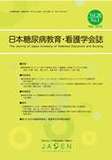Japanese
English
- 有料閲覧
- Abstract 文献概要
- 参考文献 Reference
- サイト内被引用 Cited by
【目的】本研究の目的は,糖尿病患者を多角的に捉えるために糖尿病患者のセルフケア能力の要素を活用した教育プログラムを看護師に実施し,教育プログラムについての看護師の反応を明らかにし,プログラムの内容を検討することである.
【方法】研究協力に同意の得られた3施設で,教育プログラム時の看護師の反応と教育プログラム後の看護師15名への半構造化面接で得たデータを質的統合法(KJ法)を用いて分析した.
【結果】施設毎にKJ法を用いて分析を行った結果,A施設9つ,B施設7つ,C施設9つのシンボルマークが抽出された.これらを類似性と相違性に着目して分類した結果,教育プログラムに関する看護師の反応は,[対象理解の広がり][教育プログラムへの興味・関心][自分自身の看護の内省][対象への援助方法の明確化][看護実践の変化][今後の活用方法][教育プログラムの課題]の7つのカテゴリーに分類された.
【考察】教育プログラムは多角的な対象理解を促す目的で行われたが,それは[対象理解の広がり]に留まらず[看護実践の変化]にもつながることが示された.本研究の結果から,教育プログラムの有効性及び洗練のための示唆を得ることができた.
[PURPOSE] The aim of the present study was to clarify the responses of ward nurses who participated in a nursing education program targeting that utilized elements of the self-care ability of people with diabetes (referred to below as the ‘education program’),and evaluate the contents of the program.
[METHOD] At three consenting institutions, we analyzed nurse responses at the time of the education program and data from semi-structured interviews with 15 nurses afterwards using a qualitative synthesis method (the KJ Method).
[RESULTS] As a result of the analysis using the KJ Method for each institution, 9 symbol marks were extracted for Institution A, 7 for Institution B, and 9 for Institution C. After categorization by focusing on their similarities and differences, the responses of the nurses in relation to the education program were sorted into the 7 categories of ‘broadening of subject understanding’, ‘swelling of interest for the education program’, ‘techniques for supporting patients became clearer’, ‘reflection on one's own nursing practices’, ‘change in nursing practice’, ‘future application methods’, and ‘topics of the education program’ (Symbol mark is expressed the contents of the final label obtained by repeating the grouping).
[CONCLUSIONS] While the education program was carried out with the aim to encourage a diversified subject understanding, the results demonstrated that this was not limited to ‘broadening of subject understanding’, but was also connected to ‘change in nursing practice’. We were able to obtain suggestions for the refinement and effectiveness of the education program from the results of this research.
Copyright © 2016, Japan Academy of Diabetes Education and Nursing. All rights reserved.


